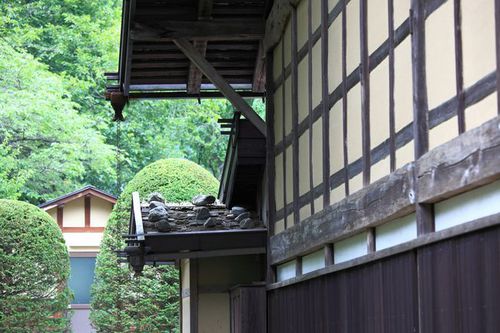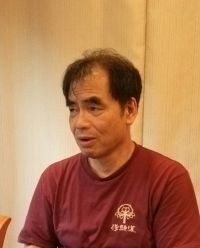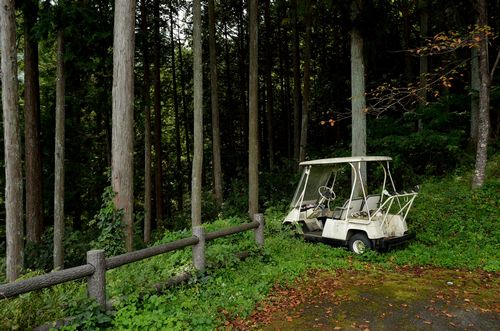December 9, 2014
What Kind of Economy Produces True Affluence? - Interview with Philosopher Takashi Uchiyama (Part 2)
Keywords: Newsletter Steady-State Economy
JFS Newsletter No.147 (November 2014)

The former Kurosawa family residence Ueno Village, Gunma Prefecture
Image by TANAKA Juuyoh Some Rights Reserved.
The Institute for Studies in Happiness, Economy and Society, with JFS as its outreach partner, is undertaking a project, "What Is Economic Growth? -- Interviews with 100 People," in collaboration with Patagonia Japan. The project aims to encourage people to think about economic growth by asking specialists from many different fields to share their ideas about economic growth.
In the first half of the interview with a Japanese philosopher Takashi Uchiyama in the previous issue of the JFS Newsletter, he introduced Ueno Village in Gunma Prefecture as an example of a locally-based economy that requires no growth. This case can contribute to the discussion about how beliefs in economic growth should be drastically changed. Here we introduce the latter half of the interview dealing with topics such as problems of our society after a shift from being community-based to individualism, and the relationship between economic growth and a sustainable, happy society.
What Kind of Economy Produces True Affluence?
- Interview with Philosopher Takashi Uchiyama (Part 1)
http://www.japanfs.org/en/news/archives/news_id035089.html
---------------------------------------
Edahiro: Unless the value of the goods the village needs to buy from the outside continues to increase, the value of the goods they produce to sell to the outside need not increase. It will suffice to produce and sell the equivalent of what they need to buy. Is this what you mean?

Takashi Uchiyama
Copyright ISHES All Rights Reserved.
Uchiyama: That's right. Let's suppose that I start hotel business in Ueno. If I expand my business and many large groups of tourists visit the village, the burden on the village will become rather heavy. Individuals tend to expand their businesses if left to themselves. But people in this region are well aware that they are making a living within a local economy. When, for example, I think about increasing the number of rooms in my hotel to 100 or 500, I will also have to think about whether the plan will be good for the regional society or not.
Edahiro: Does this mean that the economy is integrated into the society, as you said earlier? If so, you are saying that the presence of a local community serves as a brake that doesn't work in large cities such as Tokyo, aren't you?
Uchiyama: Exactly. People can re-create this kind of local economy in their own area when the situation allows. With respect to another trend in Japanese society, family-business-based economies are also expected to grow.
Edahiro: What are the costs of economic growth, if any?
Uchiyama: There is no doubt that one such cost is the burden placed on the natural environment. Another is that an economic growth-oriented society will become more individualistic. This is because society cannot aim for economic growth when a community-type society remains in place.
Economic growth-oriented societies need to have a structure that can provide enough labor and consumers to continue increasing GDP, and this accelerates individualization of the society. Therefore any country with a large economy will move toward an individual-based society. Now we are facing increased social burdens and problems due to the individualization of society.
For example, in Tokyo, about 10 percent of elderly residents die without funeral ceremonies or anyone to pray for their souls. The percentage for all Japan is about 5 percent. Thus we have created a society of isolation and helplessness.
As symbolized above, various problems have arisen throughout Japan. These are nothing but the results of the postwar era, including the hyper-growth period. That was how we created an individual-based society.
Edahiro: How can we correctly understand the relationship between economic growth and a sustainable, happy society and apply that understanding?
Everything depends on how far the local-scale economy can be extended. If something can be done locally, do it locally. If someone can make a living employing a new form of family business, they should just do it.
For instance, not a few young couples start up their own cake shops or other retail businesses. In this kind of situation, they do not need 10,000 customers. They would need perhaps about 100 customers a day, or sometimes 30 to 40 customers, in order to make the wheels go around.
To secure 30 to 40 customers a day, they may need to have 10 to 20 times more prospective customers, but never as many as 50,000 or 100,000. All they have to do is to care about people who come and buy their products.
I think this kind of approach in its various forms constitutes social reform triggered by local scale economies, in which the prevailing capitalist economy is gradually confined into a limited role.
Of course, such small businesses can hire employees but there are "limits of scale." As a rule of thumb, I should say the upper limit is about 300 people. With fewer than 300 employees, they can share a single goal and discuss things with one another.
When the number of employees exceeds 300, however, a company will have to establish independent departments to manage them. Once established, administrative departments, namely human resources and general affairs departments, start playing a central role in the company. In this kind of company, employees never feel motivated to work hard together.
Edahiro: Where we have formerly been focusing on "economies of scale," we will need to pay more attention to "limits of scale," is that right?
Uchiyama: Yes. In the present society, "dis-economies of scale" have become increasingly obvious. If, for example, Ueno village should attempt to generate electricity with wood pellets, more than 100 percent of its power needs could be met by three medium-sized generators. There are abundant wood resources available in the mountain village.
This can be done because Ueno is a small village with a population of about 1,400. Its smallness actually works to its advantage. The village could produce the necessary amount of wood pellets without devastating its forests. By contrast, cities like Tokyo may actually suffer disadvantages because of their huge size.
After all, the act of considering things from a large-scale perspective in itself will engender disadvantages. For example, people may have difficulty answering the question "What should Japanese families be like?" However, when asked "What should your family do?" people can deal with the question by considering their own circumstances and seeking compromises among family members.

Ueno Village, Gunma Prefecture
Image by ogajud Some Rights Reserved.
Interview and Edit by Junko Edahiro
Related
"JFS Newsletter"
- 'Good Companies in Japan' (Article No.4): 'Eightfold Satisfaction' Management for Everyone's Happiness
- "Nai-Mono-Wa-Nai": Ama Town's Concept of Sufficiency and Message to the World
- 'Yumekaze' Wind Turbine Project Connects Metro Consumers and Regional Producers: Seikatsu Club Consumers' Co-operative
- Shaping Japan's Energy toward 2050 Participating in the Round Table for Studying Energy Situations
- 'Good Companies in Japan' (Article No.3): Seeking Ways to Develop Societal Contribution along with Core Businesses


